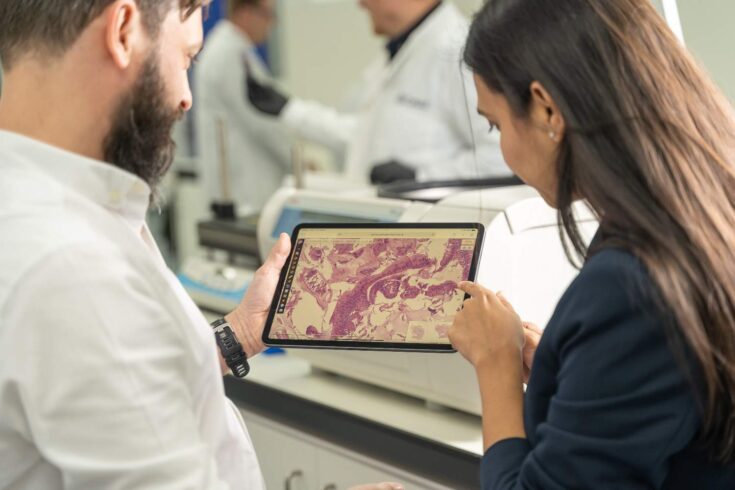One of the greatest challenges currently faced by the UK healthcare system is the growing backlog of people waiting for potentially life-saving diagnostic tests. In England alone, there were 4.6 million fewer cancer diagnostic tests, including endoscopy, carried out in the first year of the pandemic.
Patient wait times have significant implications, as early detection is critical to saving lives, and oesophageal cancer is no exception. When diagnosed with oesophageal cancer at a late stage, only around 20% of patients survive for one year or more. When detected at an early, pre-cancerous stage (Barrett’s oesophagus), over 80% of patients survive.
About the project
A challenge this large cannot be faced by the NHS alone. Industry leaders have come together to form Project integrateD diagnostic solution for EarLy deTection of oesophageal cAncer (DELTA), funded by UK Research and Innovation (UKRI) and Cancer Research UK.
Project DELTA is a collaboration between the universities of Cambridge and Oxford, King’s College London, the PHG Foundation, Medtronic and Cyted, which focuses on improving the diagnosis of oesophageal cancer.
Researchers at the MRC Cancer Unit in Cambridge developed the Cytosponge device. MRC and Cancer Research UK (CRUK) then funded clinical trials showing the test to be well-tolerated, safe and accurate. The Cytosponge test is a novel diagnostic process that uses a ‘sponge-on-a-string’ device to collect cells from the oesophagus. The teams behind Project DELTA have worked together to develop the clinical implementation of the device including digital diagnostic processing and analysis.
The powerful data platform identifies the patients who are most at risk of Barrett’s oesophagus or early oesophageal cancer, so they can subsequently be prioritised for endoscopic confirmation and subsequent treatment.
Tackling the backlog
In December 2021, the NHS reported diagnostic waiting time data showing a waitlist of over 68,000 patients for an upper GI endoscopy in England. Of these patients, nearly 40% are waiting over six weeks (XLSX, 400KB). As a triage tool, the Cytosponge is invaluable for the NHS in tackling the national backlog challenge.
The UKRI and Cancer Research UK-funded DELTA project has enabled Cyted to work with the NHS to facilitate the rapid implementation of the Cytosponge test in clinical practice.
Since late 2020, over 6,000 Cytosponge procedures have been carried out in the UK, resulting in a significant number of patients being diverted from endoscopy waiting lists.
Quick, efficient and minimally invasive
Michelle Mitchell, Chief Executive of Cancer Research UK, said:
A quick, efficient, and minimally invasive diagnostic test like the Cytosponge can go a long way towards reducing the stress and anxiety that accompanies the wait for a test. And diagnosing cancer as early as possible is absolutely vital for improving outcomes for patients.
After decades of research by Cancer Research UK-funded scientists, we are excited to see that this technology is already well on its way to helping bring patients off endoscopy waiting lists across the UK.
Impacts of the project
Funding from UKRI through Project DELTA has been vital in supporting Cyted to accelerate the implementation of the Cytosponge test and further develop the artificial intelligence technology. This will trigger a new era in the diagnosis of oesophageal cancer.
Through the digital and data-driven advancements developed by the Project DELTA teams, the number of patients waiting for endoscopy will be significantly reduced. Therefore, this ensures patients receive their diagnosis early so they can start potentially life-saving cancer treatment at a stage that it is most likely to be successful.
Top image: Credit: Cyted

